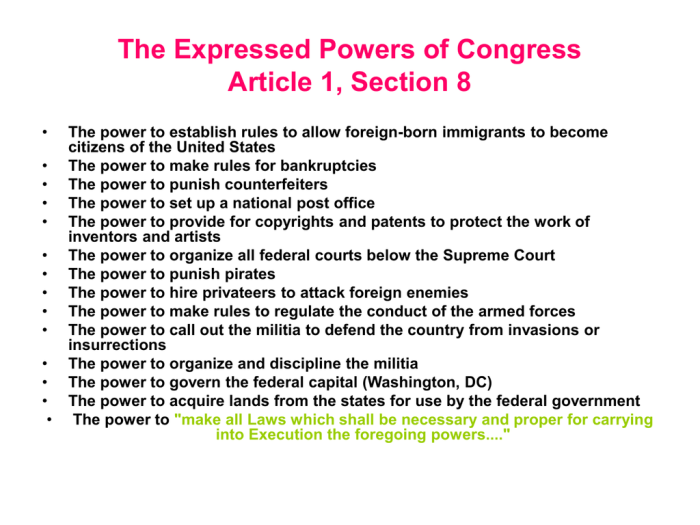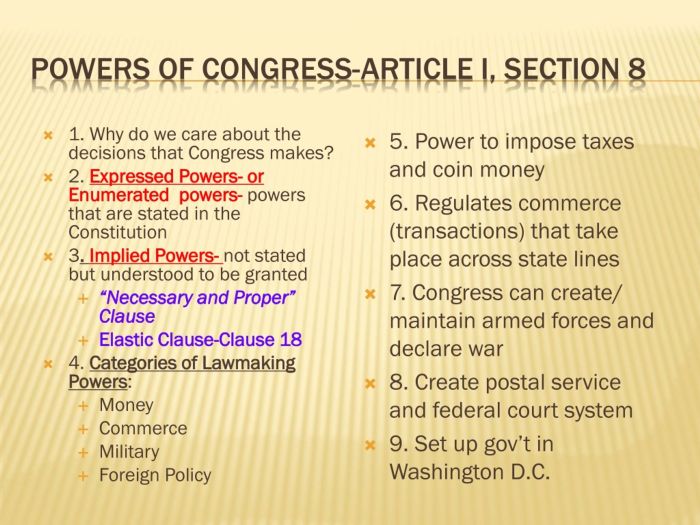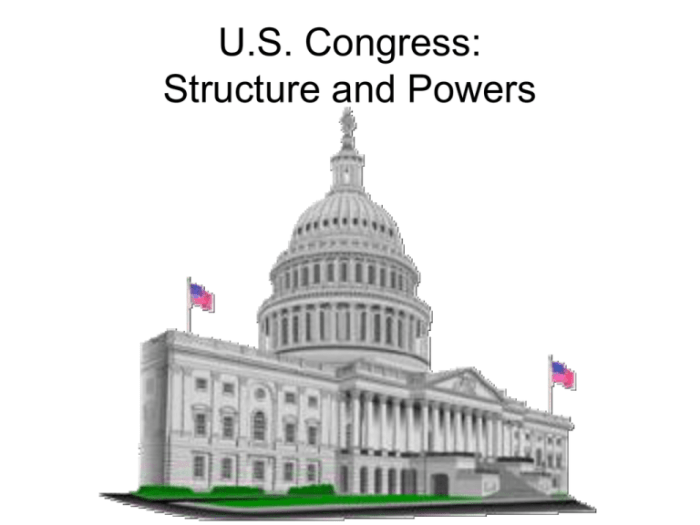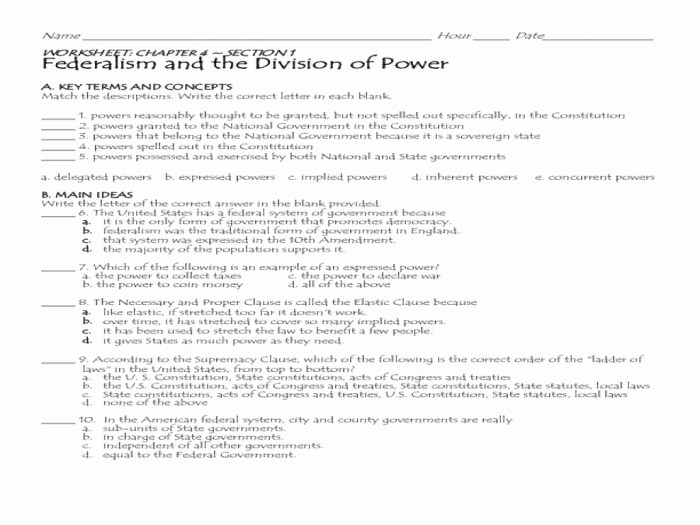The Powers of Congress Worksheet Answers provide a comprehensive guide to the legislative authority of the United States Congress. This in-depth analysis explores the enumerated, implied, and non-legislative powers granted to Congress by the Constitution, examining their limits and the checks and balances that ensure the balance of power within the American government.
This worksheet delves into the intricacies of Congress’s role in lawmaking, oversight, impeachment, treaty ratification, and other essential functions. It illuminates the delicate balance between the three branches of government and the importance of Congress in representing the interests of the people.
Powers Delegated to Congress

The Constitution grants Congress specific powers, known as enumerated powers, that it can exercise. These powers include:
- To lay and collect taxes: Congress has the power to impose taxes on income, property, and other sources to generate revenue for the federal government.
- To borrow money: Congress can borrow money on behalf of the United States to finance government spending and debt.
- To regulate commerce: Congress has the authority to regulate trade and commerce between states and with foreign nations.
- To declare war: Congress has the sole power to declare war against other countries.
- To raise and support armies and navies: Congress is responsible for creating and maintaining the armed forces.
Congress’s delegated powers are limited by the Constitution. For example, Congress cannot pass laws that violate the Bill of Rights or that discriminate against specific groups of people.
Implied Powers of Congress
In addition to its enumerated powers, Congress also has implied powers that are not explicitly stated in the Constitution. These powers are derived from the “necessary and proper” clause in Article I, Section 8 of the Constitution. This clause gives Congress the authority to make laws that are “necessary and proper” for carrying out its enumerated powers.
Examples of implied powers that Congress has exercised include:
- Establishing a national bank: Congress has used its implied powers to establish the Federal Reserve System, which serves as the central bank of the United States.
- Regulating the internet: Congress has passed laws to regulate the internet, even though the internet was not specifically mentioned in the Constitution.
- Creating government agencies: Congress has created numerous government agencies, such as the Environmental Protection Agency and the Food and Drug Administration, to carry out its functions.
The implied powers of Congress are also limited. Congress cannot use its implied powers to pass laws that are not related to its enumerated powers or that violate the Constitution.
Non-Legislative Powers of Congress, Powers of congress worksheet answers
In addition to its legislative powers, Congress also has several non-legislative powers. These powers include:
- Oversight: Congress has the power to oversee the executive branch and ensure that it is carrying out the laws passed by Congress.
- Impeachment: Congress has the power to impeach the President, Vice President, and other federal officials for “treason, bribery, or other high crimes and misdemeanors.”
- Treaty ratification: Congress must approve any treaties negotiated by the President before they can become law.
These non-legislative powers are important in the balance of power because they allow Congress to check the power of the executive branch.
Checks and Balances on Congress
There are several checks and balances in place to limit the power of Congress. These checks and balances include:
- The President: The President has the power to veto bills passed by Congress, which can prevent them from becoming law.
- The Supreme Court: The Supreme Court has the power to declare laws passed by Congress unconstitutional, which can overturn them.
- The states: The states have the power to pass laws that conflict with federal laws, which can create legal challenges to the authority of Congress.
These checks and balances are effective in preventing Congress from becoming too powerful. They ensure that Congress must work with the other branches of government to pass laws and that its power is limited by the Constitution.
The Role of Congress in American Government
Congress is one of the three branches of the U.S. government. It is responsible for making laws, overseeing the executive branch, and representing the interests of the people.
Congress interacts with the other branches of government in several ways. It passes laws that the President must enforce, and it oversees the executive branch to ensure that it is carrying out the laws passed by Congress. Congress also interacts with the Supreme Court by passing laws that interpret the Constitution.
Congress is important in representing the interests of the people because it is the only branch of government that is directly elected by the people. This gives Congress a unique voice in the government and allows it to represent the views of its constituents.
Helpful Answers: Powers Of Congress Worksheet Answers
What are the enumerated powers of Congress?
The enumerated powers are those specifically granted to Congress by the Constitution, such as the power to levy taxes, declare war, and regulate interstate commerce.
How are implied powers derived?
Implied powers are not explicitly stated in the Constitution but are inferred from the enumerated powers and the “necessary and proper” clause.
What are some examples of non-legislative powers of Congress?
Non-legislative powers include oversight, impeachment, and treaty ratification.
How do checks and balances limit Congress’s power?
Checks and balances include the President’s veto power, the Supreme Court’s power of judicial review, and the states’ role in the amendment process.


